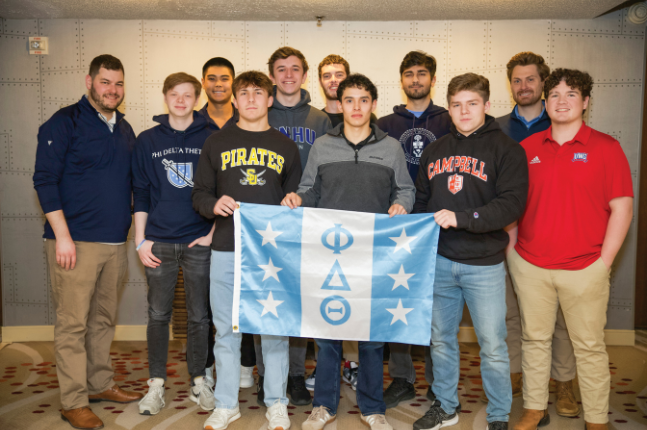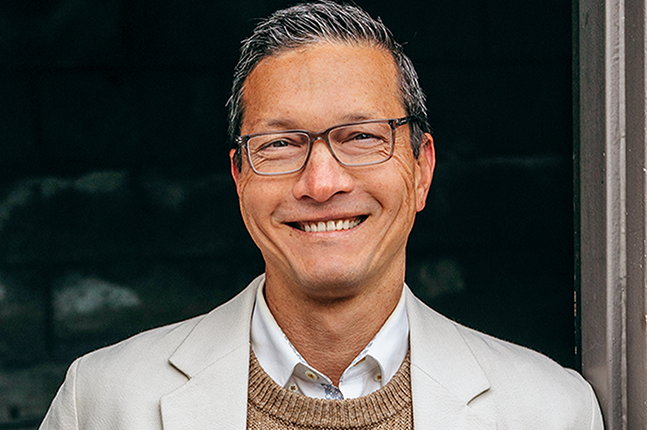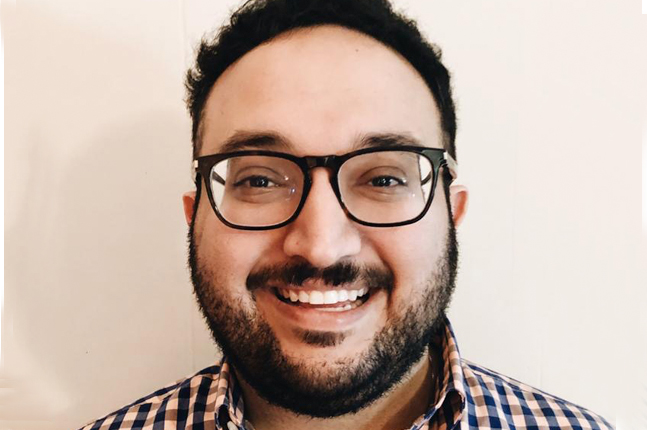By Rich Fabritius, General Council President
It’s an incredible honor to have been elected the 65th president of Phi Delta Theta. To think of the men I admire and respect that have held this position before me renders me humbled, and I’m found lacking for the appropriate words to express my gratitude for your trust and support. Thank you so very much.
The General Convention is always a tremendous opportunity for our Phi Delt family and friends to gather and celebrate. We are a blessed organization in so many ways. Blessed with incredible, committed alumni and volunteers. We are blessed with a multitude of undergraduate members who’ve chosen to define their college experience by something more than being drunk and “Fratty.” Blessed with a legacy of courageous leadership that defines and positions Phi Delta Theta at the forefront of the fraternity movement. Our position in the fraternity world – and our reputation on campuses across North America – is a testament to the work that has been done over 166 years. It is that legacy that calls and compels us forward. It is a legacy of leadership that provides the environment for young men and alumni alike to be more than common. To excel and strive for greatness individually and collectively.
As we look towards these next two years, I’m reminded of a baseball story I heard recently.
Only four baseballs have ever been hit so hard that they flew out of Dodgers Stadium. The same player – Willie Stargell – of the Pittsburgh Pirates, hit the first two. His first blast was the longest ever in LA, measuring 507 feet. Incidentally, his second bomb was hit on my 2nd birthday… so perhaps I was meant to hear his story and carry it forward.
Consider some of these remarkable facts about Stargell’s slugging prowess: In 61 years, only 18 home runs cleared the right field roof at cavernous Forbes Field in Pittsburgh. Stargell hit seven of them. Only six homers landed in the upper deck at Three Rivers Stadium. Stargell hit four of them. In 1978, he launched a ball 535 feet into the shadowy recesses of Montreal’s Olympic Stadium. The Expos organization commemorated the event by identifying the seat where the ball landed… and painting it gold. The dude could flat out crush the ball. The Dodgers’ Don Sutton said it best when reflecting upon Stargell’s skills, “He doesn’t just hit pitchers. He takes their dignity.”
Beyond being an amazing athlete and first-ballot hall-of-fame slugger, Stargell was known throughout baseball for coming to the plate with a bat that would be considered heavy even by major league standards. An average major league bat weighs about 32 oz. Over the years, Stargell’s lumber far exceeded that average. In fact, he used a sledgehammer in the at-bat circle to warm up.
When asked about his abnormally heavy bat, he acknowledged that it wasn’t easy learning to hit with it. The heavy lumber required a great deal of hard work and commitment. He believed that if he pushed himself, he could be more than an average major league slugger. He believed that swinging a heavier bat would produce hall-of-fame results.
While unorthodox, the results of Stargell’s labors are undeniable. In his career, he hit 475 dingers and most baseball historians believe he would have eclipsed 600 had he not played home games in such large, pitcher-friendly parks.
Stargell was introduced to the concept of swinging a heavier bat from Roberto Clemente at Pirates spring training. Clemente believed that while more difficult, the effort yielded better than average results… for the right player.
I live in Atlanta and the Braves are a big deal. There’s been no ballplayer since Hank Aaron more beloved than Chipper Jones. Chipper was the #1 overall pick by the Braves in 1990. Chipper’s first hitting coach in the minor leagues was, you guessed it, Willie Stargell. And while Chipper’s dad was always the bat-whisperer in terms of his swing mechanics, it was Stargell who recognized an uncommon work ethic and ability in Chipper and introduced him to the idea of swinging a heavier bat.
Jones retired last season and is ranked fourth all time in home runs for a third baseman and first in RBIs. It was never easy swinging a heavier bat, but Chipper committed himself to the practice because he knew that it would propel his performance forward.
One of the most exciting and talented new ballplayers in the majors is Bryce Harper of the Washington Nationals. He’s gritty. Tough. And, yes, abrasive at times with his cockiness. Bryce Harper swings a heavier bat. And it was Chipper Jones at a Braves/Nationals spring training session that introduced the young Harper to the idea of swinging a heavier bat.
A select few of the game’s greats have swung a heavier bat. Names like Ruth and Cobb and, yes, even our own Lou Gehrig.
All believed that they could be better than their peers if they dug in, worked harder and asked a little more of themselves. In the process, they’d develop into great ballplayers – the greatest version of the athlete within themselves. They could have been very good. Perhaps even been all stars and hall-of-famers without the sacrifice made. But they wanted more. Knew they could do more. Knew that there was something inherently great within them that needed to be brought out; forged through the fire of hard work and determination.
So it is tonight. We sit here as an organization that by most accounts is already one of the best – if not the best – of its kind in existence today. And yet we can do more. We should do more as the leaders of the fraternity movement.
We all have heavier bats to swing for I know – I believe – that within us – individually and collectively – is the ability to separate ourselves even further from the competition. Our committed and faithful volunteers must swing a heavier bat. All of our undergraduate members must swing a heavier bat. Our GHQ staff must swing a heavier bat. And yes, your General Council must swing a heavier bat.
We all need to recognize the opportunity before us. An opportunity to separate ourselves from the sea of sameness and mediocrity that is all too familiar in today’s Greek world. An opportunity to create value on our campuses and communities that is recognized and rewarded with success academically, socially, philanthropically and in chapter size.
Your General Council’s bat consists of some very real, very important issues that require attention and priority.
We’ve got such an incredible story to tell. We’re not an organization comfortable with telling our story and proactively marketing itself. Most, if not all the fraternities today, would kill to be in our shoes. We are leaders on campus. In the classroom. On the field. Simply, we have what many young men attending college want. Moving forward, you’ll see us increase the sophistication of our marketing apparatus by developing the programs necessary to get Phi Delt headed down the road to becoming a true marketing organization. Fundamental to this is creating demand on campus for our undergraduate chapters where it is needed and providing materials and support across the entire enterprise. In the end, we’ll have an even more robust membership that is more connected and engaged to the larger organization and a General Fraternity that is poised for success for years to come.
Further, we must address the needs of our undergraduates and alumni in regards to housing. We’ll develop a proactive plan to deal with and manage the physical structures within our realm. We must develop a program that supports our house corporations appropriately, deals with the condition of our houses and assists those chapters who dream of having a chapter house or lodge of their own.
One of the inherent benefits of membership in our organization is the networking opportunities that exist. Regrettably, there is more talk about this than action. For far too long we’ve not capitalized on the career and professional opportunities that exists by connecting our alumni with our brothers graduating – or preparing to graduate – college. We are moving forward with a technology solution that will connect the young men seeking career opportunities with the multitudes of alumni we have across North America. There is no reason why we cannot and should not facilitate the connection between these two parties and in the process add value to being a member of Phi Delta Theta.
Finally, while we are performing well as a fraternity by most – if not all measures – we are not immune to the potentially crippling effects of alcohol, drugs, sexual assault and hazing.
Our efforts in educating our membership on these issues must be redoubled. We must reinforce the rationale for our historic alcohol-free housing initiative, and we must provide the tools and the training for all our members as it relates to the risk associated with inappropriate behaviors and bad decision making. We must continue to throw ourselves tirelessly at the issue of Phikeia education and hazing. Our staff and volunteers have done yeoman’s work developing and introducing a model Phikeia program that provides our local chapters the freedom they desire with a pledge program while insuring that the overall mission and standards of Phi Delta Theta are met and understood among our new members. Yet, in many corners of North America, we continue to dwell in an archaic and counterproductive culture that places tradition above human dignity. It’s not right, and we will continue to work on the eradication of destructive pledge education activities. While not the panacea, the model program will receive greater attention and amplification moving forward. There is no room in Phi Delta Theta for members or chapters who believe that brotherhood consists of degrading and demoralizing those who you claim as brothers. We expect excellence and an evolved sense of right and wrong. I believe in all my heart, that on each campus and across our vast Fraternity, that we can be better than the practices inherited from those before us. We must not ever give up, and we desperately need all your help if we’re ever going to make sustained progress in the fight against hazing.
As I look forward, towards the next two years and beyond, I see many opportunities for our great Brotherhood. Yes, there are challenges but we will meet them head on as we have with all other challenges that have beset our path over the years and through the decades. We have been – and will always be – the leaders of the fraternity movement.
And, while we are enjoying success and prosperity, there is much work to be done. We cannot settle and rest. For within our collective beats the heart of a champion. Our Founders call to us – challenge us – to be more than adequate or average. We are leaders and if there was ever an organization that should swing a heavier bat, it is Phi Delta Theta.
This will be a great biennium with so much promise to be capitalized upon and fulfilled. Let’s propel Phi Delta Theta forward by first preparing ourselves, each, individually, to swing that heavy bat.





